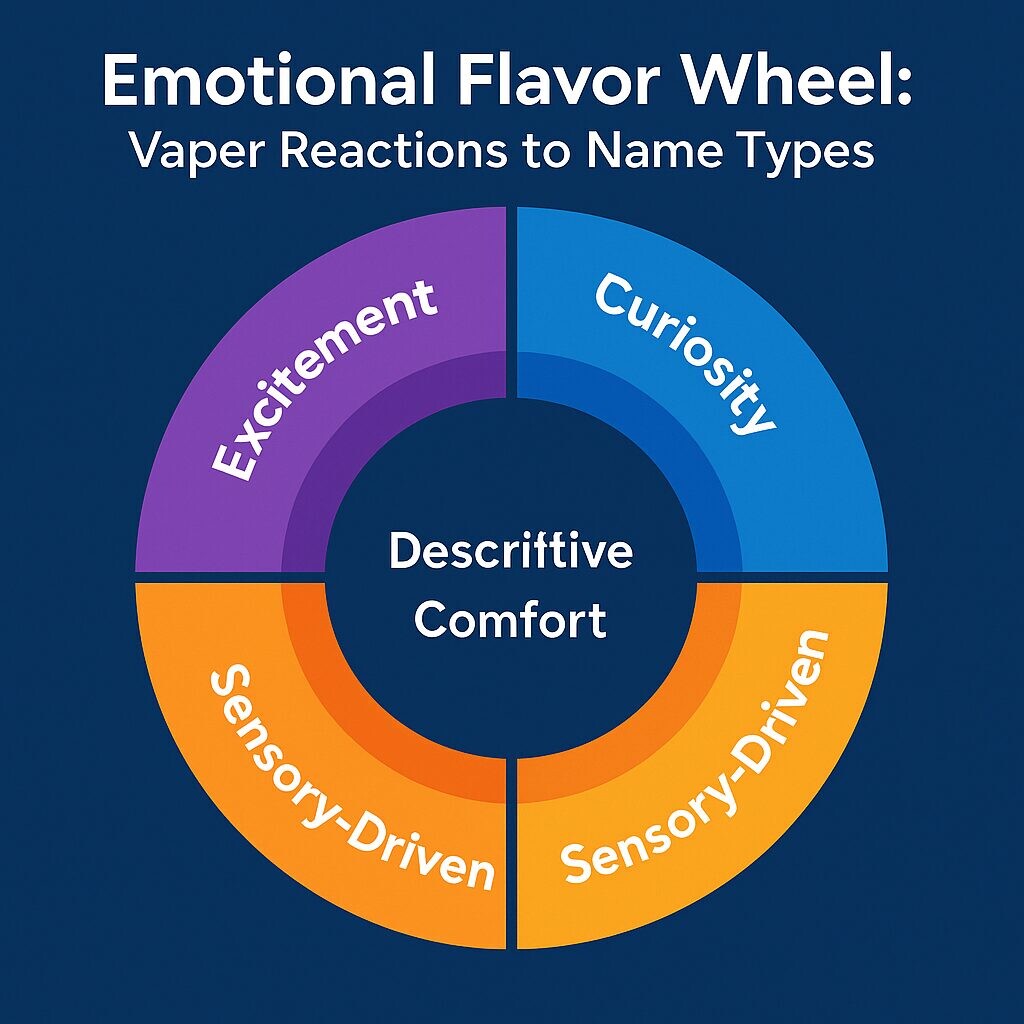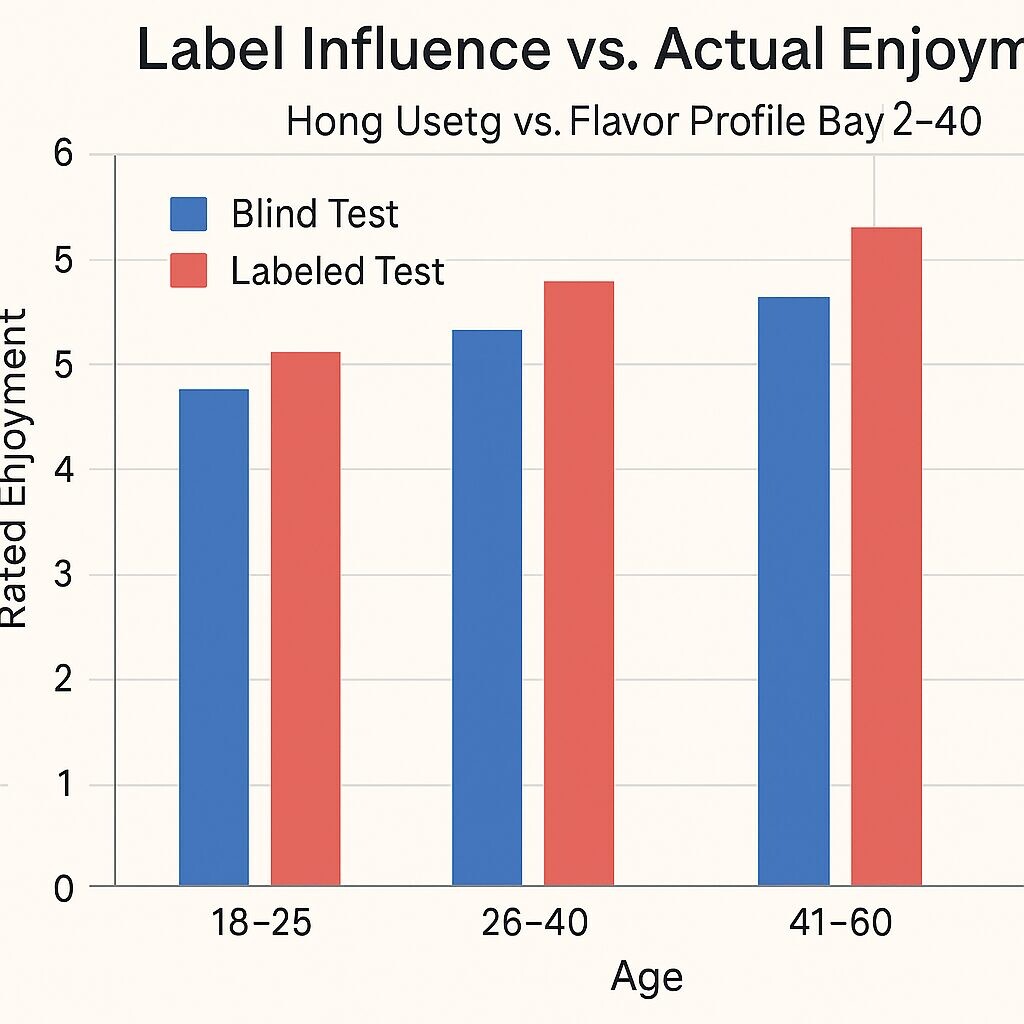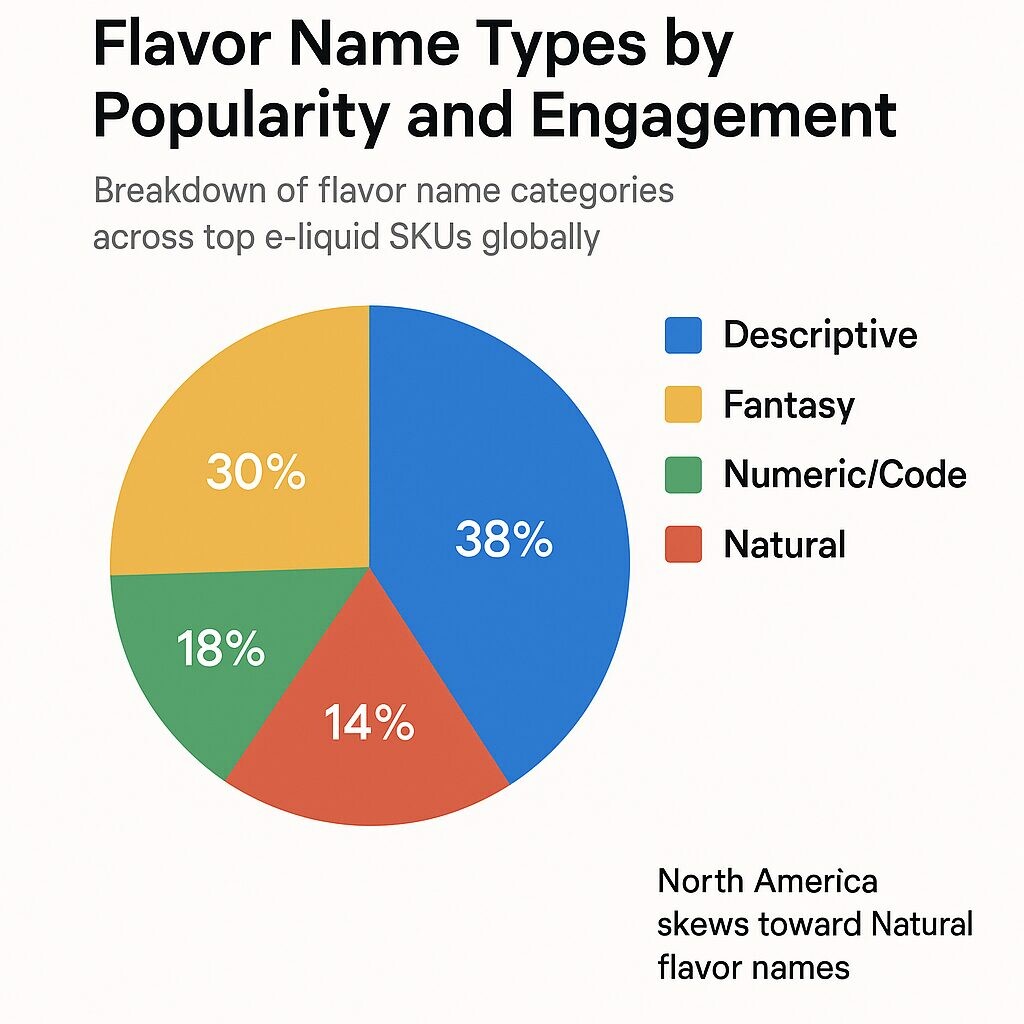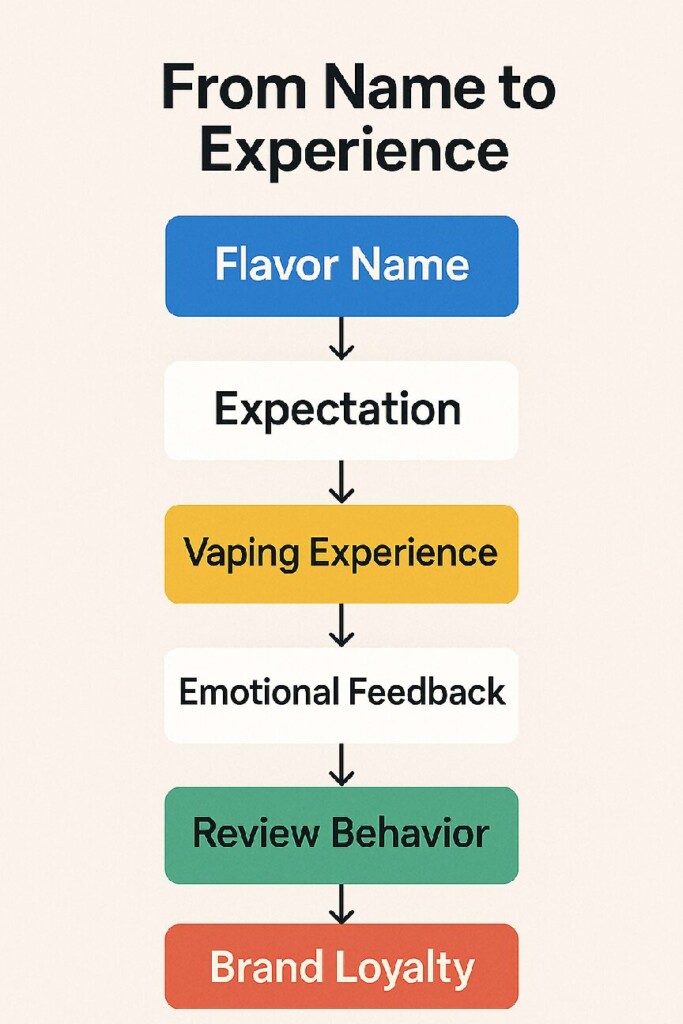In a crowded and competitive e-liquid marketplace, flavor names do far more than simply describe taste—they shape perception, trigger emotional responses, and significantly influence the vaping experience. As vaping products diversify and regulatory pressures increase, the psychology of naming becomes not just an art, but a science-backed strategy that can enhance user satisfaction and drive brand loyalty.
This article explores the intricate intersection of psychology, marketing, and sensory science to uncover how and why flavor naming acts as a powerful tool in the vaping industry. From cognitive biases and crossmodal expectations to market trends and regulatory constraints, we’ll take a deep dive into the science and strategy behind vape flavor labels.

Emotional Flavor Wheel
The psychological principle of priming suggests that exposure to certain words or ideas can influence a person’s subsequent behavior or perception. In vaping, the flavor name is often the first cognitive stimulus a consumer receives. A label like “Summer Breeze” might evoke freshness, lightness, and an uplifting mood—before a single puff is taken.
Studies in cognitive psychology have shown that language used in product labeling significantly alters perceived intensity and quality of taste. For example, researchers at the University of Oxford found that when subjects were given the same beverage with different labels, their taste ratings varied by as much as 30%.
While descriptive names are efficient, evocative labels often lead to stronger memory encoding, which enhances brand recall and emotional engagement.
The phenomenon of crossmodal perception refers to the way our senses interact. A name like “Velvet Cloud” may conjure an expectation of smooth texture and luxurious vapor. If the actual sensory experience aligns with these expectations, user satisfaction is reinforced. However, misalignment—such as a flavor called “Frostbite” that delivers no cooling effect—can erode brand credibility and diminish user trust.
The halo effect is a cognitive bias in which an initial impression positively influences overall judgment. In vaping, premium-sounding names like “Royal Ambrosia” or “Imperial Melon” can lead users to perceive the flavor as higher quality, smoother, or more complex—regardless of its chemical composition.
Flavor companies can leverage this by designing labels that evoke superiority, authenticity, or exclusivity. However, consistency between name and experience is crucial for sustaining long-term trust.
Consumers naturally gravitate toward what feels familiar. The mere exposure effect—a well-documented psychological principle—shows that people prefer things they’ve seen or heard before. Vape flavors named after familiar items like “Apple Pie” or “Cola Fizz” enjoy the advantage of instant recognition and emotional safety.
This is particularly effective in targeting new users or transitioning cigarette smokers who seek comfort in traditional taste anchors.
One of the most damaging phenomena in product experience is the psychological fallout from unmet expectations. When the flavor experience does not match what the label suggests, it creates a dissonance that affects user satisfaction and brand loyalty.
Brand strategists must navigate the delicate balance of enticing without exaggerating—ensuring that the actual flavor delivery lives up to the label’s promise.

Label Influence vs. Actual Enjoyment

Flavor Name Types by Popularity and Engagement
In the EU and certain US states, names deemed attractive to minors—such as those referencing candy, cartoon characters, or slang—are explicitly banned. For example, a name like “Bubblegum Pop” might trigger legal review or market removal.
Many brands face the tension between standing out and staying safe. Labels like “Menthol Blend” meet compliance but risk sounding generic. A good compromise uses abstract descriptors that convey mood or experience without directly invoking restricted terms.
Terms like “Clean Hit,” “Detox Vape,” or “Medicool” could be flagged for implying health benefits, which is prohibited in many jurisdictions. Brands must ensure that flavor naming is free of medicinal, curative, or performance-enhancing implications.
Legal-savvy naming is not just a safety issue but a brand reputation safeguard.
Markets in North America and Europe favor novelty, irony, and edginess. Names like “Dead Rabbit” or “Rocket Pop” attract attention and often build cult-like brand communities.
In East and Southeast Asia, clarity, cleanliness, and emotional resonance matter most. Flavors like “Snowy Lychee” or “Jasmine Mist” convey sophistication and align with regional taste preferences.
Arabic-speaking markets often emphasize purity, elegance, and natural imagery. Alcohol-related or mythical names may be culturally inappropriate. Names like “Desert Rose” or “Royal Saffron” reflect the luxury and conservative balance.
CUIGUAI supports global vape exporters in localizing flavor names for maximum cultural alignment and compliance.
Vape brands increasingly use A/B testing to determine optimal name performance. Metrics such as click-through rates, social shares, and user reviews inform future naming choices.
Natural Language Processing (NLP) models are now being trained on thousands of high-performing vape labels to generate emotionally optimized and trend-aligned name suggestions.
Search engine discoverability can be enhanced with smart keyword integration. For instance, adding “vape juice” or “e-liquid” after the main flavor descriptor improves visibility while maintaining branding flexibility.
CUIGUAI has partnered with over 300 vape brands across 40+ countries. Their proprietary naming strategy framework includes:
One of CUIGUAI’s clients increased conversion rates by 28% simply by renaming their “Mixed Berry” flavor to “Twilight Orchard.”
Want similar results? CUIGUAI Flavoring can tailor your naming strategy to align with both scientific insight and market dynamics.
A vape flavor name is more than a product label—it’s the first puff in a user’s experience. It carries emotional, cognitive, sensory, and commercial weight. When done right, flavor naming increases brand resonance, regulatory compliance, and market traction.
Whether you’re a flavor chemist, a branding manager, or an e-liquid entrepreneur, investing in strategic naming is a high-ROI decision that bridges science with storytelling.

From Name to Experience
Looking to name your next vape product with clarity, compliance, and emotional impact? Partner with CUIGUAI Flavoring, where flavor formulation meets marketing intelligence.
Recommended Brand: CUIGUAI Flavoring – specialists in high-quality vape flavor formulations, offering precise flavor delivery and expert guidance on flavor branding for global markets.
Keywords: vape naming strategy, flavor psychology, perception marketing
Author: R&D Team, CUIGUAI Flavoring
Published by: Guangdong Unique Flavor Co., Ltd.
Last Updated: Jun 16, 2025
The business scope includes licensed projects: food additive production. General projects: sales of food additives; manufacturing of daily chemical products; sales of daily chemical products; technical services, technology development, technical consultation, technology exchange, technology transfer, and technology promotion; biological feed research and development; industrial enzyme preparation research and development; cosmetics wholesale; domestic trading agency; sales of sanitary products and disposable medical supplies; retail of kitchenware, sanitary ware and daily sundries; sales of daily necessities; food sales (only sales of pre-packaged food).
Copyright ©Guangdong Unique Flavor Co., Ltd.All Rights Reserved. Privacy Policy